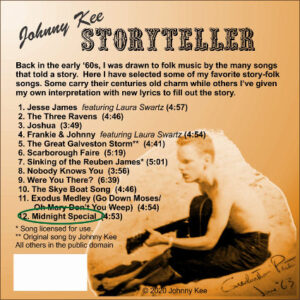Midnight Special
 Midnight Special
Midnight Special
“Midnight Special” may be the greatest mosaic of lyrics from many traditional folk songs. For example, the first verse lyrics “Get up in the mornin’ when the ding dong rings” may come from a song that appeared in print in 1905. Reference to a train and a light didn’t show up until later, appearing in print in a 1923 issue of Adventure magazine. Carl Sandburg published two separate versions of “Midnight Special” in the 1927 American Songbag. The first commercial recording was made in 1926 as “Pistol Pete’s Midnight Special”.
Even though there were several earlier recordings, Huddie “Lead Belly” Ledbetter’s version recorded at Angola Prison in 1934 gained widespread popularity. Ledbetter added several verses that referred to a Houston jailbreak. This recording was captured by John and Alan Lomax, collectors of authentic folk songs at their source, who attributed the song to Ledbetter. Even though that has been debunked, some collections still show Ledbetter as the song’s creator.
In their Best Beloved American Folk Songs book, John and Alan Lomax identify the Midnight Special as a train from Houston to the Sugar Land Prison. In the song, the light represents the light of salvation, with the train taking a prisoner away from the prison to freedom. Other versions placed the prison in North Carolina (Ray Martin, 1939, “North Carolina Blues”) and Mississippi (recorded by the Lomaxes at the Mississippi State Penitentiary). There were certainly other versions that locate the train in other states.
When the “folk music revival” of the ’60s hit, “Midnight Special” was recorded by virtually everyone, including Big Bill Broonzy, Brownie McGhee, Odetta, The Kingston Trio, Pete Seeger, Peter, Paul, and Mary, the Beatles, Burl Ives, Bobby Darin, Van Morrison, Little Richard, Eric Clapton, Hoyt Axton, Creedence Clearwater Revival, Harry Belafonte, Paul McCartney (as a solo), ABBA, and dozens of others. There were many mixtures of verses, many of them in no apparent order.
As you can see from the variety of genres that these singers represent, there are many styles in their interpretations, from folk to blues to rock to country, to just about anything. Over the past 50+ years, I played and sang this song in pretty much an acoustic folk style. But for this recording, I decided to give it more of a blues feel.
For my interpretation, I arranged pairs of verses in three segments, separated by a chorus. The first segment places the singer in prison. The second segment tells of “little Rosie” going to the governor to request a pardon for “her man.” In the third segment, I moved the song’s location (usually identified as Houston) to my home in Melbourne, FL, and warned the listener from doing wrong lest our Sheriff Wayne Ivey (at the time of this recording) would send you to our county jailhouse in Sharpes.
Listen to a 1 minute preview of this track here:
